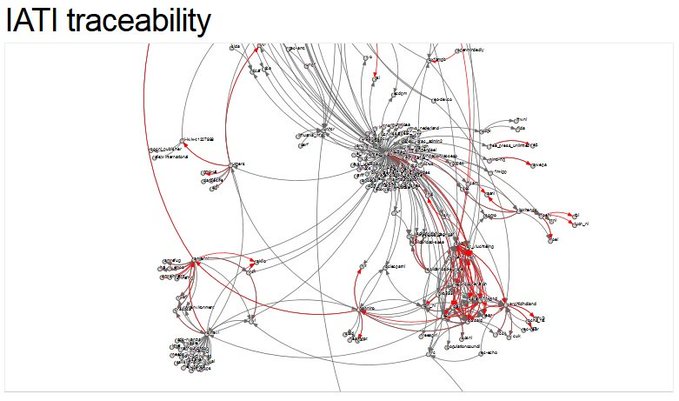News Roundup – Humanitarian Transparency, A Traceability Jellyfish, US Foreign Assistance Data Plus Tracking aid in Yemen and the Philippines
From the ground up: new humanitarian transparency research
One of the Grand Bargain commitments agreed three years ago was to improve the transparency of humanitarian spending. So far, the full potential of more transparent humanitarian information is yet to be realised. This can only be done if the information made available is actively used and benefits local and national humanitarian responders.
In a new blog, James Coe explains why and how Publish What You Fund is working with Ground Truth Solutions on a new research programme to understand the information needs of humanitarian actors.
The traceability jellyfish
Tracing resources along the development chain, from source to frontline expenditure, is an important element of transparency for all data users. We recently produced a visualisation of all the links between current IATI data. The results surprised us, and in a new blog we explain why.
A missed opportunity for US foreign assistance data?
The Foreign Aid Transparency and Accountability Act (FATAA) was passed by Congress in 2016 to require the US agencies involved in implementing foreign assistance to publish detailed country-based information on their activities. The Office of Management and Budget (OMB) recently assessed how well the 22 agencies are complying with the data requirements. Our US representative Sally Paxton and the Brookings Institution’s George Ingram have been analysing the OMB report and conclude that it falls short in a number of ways. In this blog they summarise the gaps and missed opportunities.
And here’s what else has been happening over the last few weeks…
The State of Open Data – Histories and Horizons is a new book that provides a review of the first 10 years of open data. The book brings together over 65 authors from around the world to examine open data from historical, sectoral, and regional perspectives. It considers the past, present and future of open data and has informative chapters on accountability and corruption, and development assistance and humanitarian action.
Human rights activists in Yemen have launched an online campaign to demand transparency, including the publication of financial statements, by aid organisations to show how they are distributing the aid they receive for Yemen. Reem al-Hashimi, the United Arab Emirates’ minister of state for international cooperation, announced on 8th April that her government and Saudi Arabia had to date provided more than $18 billion worth of aid to Yemen, which is currently facing an ‘unprecedented’ humanitarian crisis. The Where is the money? campaign has been active for a month, and told Al-Monitor that it was started because very few people are benefiting from the billions of aid pledged by international donors.
Meanwhile, the Manila Bulletin reports that nearly six years after the devastating super typhoon Yolanda hit Leyte in the Philippines, “the government’s housing program is still wanting and those affected are still asking: where did all the foreign aid go?” There are concerns that government officials pocketed the billions intended for Yolanda victims. However, in a briefing Lesley Cordero, former Undersecretary of the Office of the Presidential Assistant for Rehabilitation and Recovery (OPARR) says that the agencies focused on relief operations and putting together the recovery plan, and failed to regularly update the affected communities and other stakeholders on what was happening and what government was doing. The briefing also describes how the government established the Foreign Aid Transparency Hub to capture the amounts pledged or committed by donors during the emergency phase, and what was actually received. It calls for donors to declare the actual amount of aid they are giving, rather than pledging, to help manage public expectations.
USAID’s Foreign Aid Explorer (FAE) is an online tool which provides information on all of the obligations and spending for US foreign assistance by all US agencies. On May 1, 2019, USAID launched a new public portal on FAE, the Development Cooperation Landscape tool to allow USAID staff and the public to analyse programmes and budgets of other development actors. This easy to use tool allows users to see aid information on over 950 development partners, including bilateral and multilateral donors, foundations, the private sector, and NGOs. Using IATI data, the tool provides visualisations of top donors spending, sub-national location, planned spending, sectoral, and project level information, all sorted by partner countries. The tool is designed to be a one-stop-shop of aid information to help users better understand the development landscape in a particular country and to serve as a data source to better identify potential areas of alignment, collaboration, and engagement with development cooperation stakeholders.
A new report on the global debt crisis from the Jubilee Debt Campaign and Christian Aid states that “Three of the biggest root causes of debt crisis are lack of transparency, exploitative private sector actors, and ineffective, undemocratic global institutions responsible for managing debt.” The report calls for transparency in all loans given under UK law or by UK-based banks.


